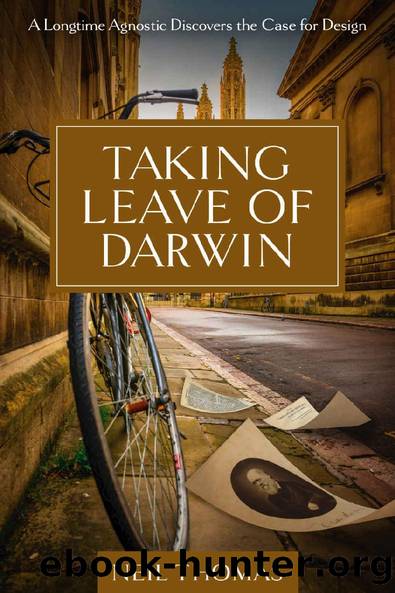Taking Leave of Darwin: A Longtime Agnostic Discovers the Case for Design by Neil Thomas

Author:Neil Thomas [Thomas, Neil]
Language: eng
Format: epub, azw3
ISBN: 9781637120057
Publisher: Discovery Institute
Published: 2021-08-01T16:00:00+00:00
5. THE MYSTERY OF MYSTERIES
Scientists should never present themselves as certain when there is doubt. The very success and truthfulness of science is founded on doubt and scepticism. It moves forward by continually rethinking, reobserving and rechecking against reality again and again to expose the flaws in current ideas.
âPhilosopher of evolutionary science Fern Elsdon-Baker1
NOAM CHOMSKY ONCE REMARKED THAT ALL MATTERS OF HUMAN puzzlement can be subdivided into two categories: problems, which can be solved, and mysteries, which cannot. He came to the conclusion that our minds must inevitably experience âcognitive closureâ with regard to some of the profoundest topics of human enquiry. He cited free will as one such mystery and human consciousness as another.2
Darwin himself acknowledged our inability to unravel every mystery when he stated that some things were unfathomable to us and that we had no more chance of understanding them than a dog would the mind of Newton.3
For this reason there is no shortage of awkward questions which bright young people ask and adults canât answer. These are the existential âbiggiesâ which people of all ages would love to have answered but in the face of which experimental science tends to fall silent, such as: How did a once barren terrestrial environment give rise to life forms? How did the resources deemed necessary to this processâself-replicating molecules bearing genetic informationâarise in the first place? What is the ultimate origin of the genetic code, and who or what directed it to produce plant and animal species? Why are we safely cocooned in a cosmic Goldilocks zone when so many parts of the universe are more reminiscent of Danteâs Inferno? Where do the laws of physics come from? What was before the Big Bang? Why is there something rather than nothing?
The laws of nature do not, alas, answer any of the above. Physics can explain much of the physical universe but not the laws of physics themselves. In fact, scientific laws do not explain the world to us even to the degree one might imagine; they merely describe certain regularities in mathematical terms, and are often referred to for that reason as secondary causes, in contradistinction to the first causeâhistorically referred to as the causa causarum, the ultimate cause of all things.
Sir Isaac Newton made this point after his discovery of the law of gravity, which, he remarked, âexplains the motions of the planets, but cannot explain who set the planets in motionâ (or for that matter, he could fairly have added, who or what established gravity itself). Newtonâs law of gravity, in other words, did not create gravity.
Oxford mathematics professor John Lennox, in his book God and Stephen Hawking, reminds us that the laws of physics are descriptive and predictive but not creative in their own right. That is, as mathematical descriptions of natural regularities, they are wholly unable to produce anything. Lennox illustrates with a modern-day parable:
In the world in which most of us live, the simple law of arithmetic itself, 1+1=2, never brought anything into being. It certainly has never put any money into my bank account.
Download
Taking Leave of Darwin: A Longtime Agnostic Discovers the Case for Design by Neil Thomas.azw3
This site does not store any files on its server. We only index and link to content provided by other sites. Please contact the content providers to delete copyright contents if any and email us, we'll remove relevant links or contents immediately.
| Anthropology | Archaeology |
| Philosophy | Politics & Government |
| Social Sciences | Sociology |
| Women's Studies |
Born to Run: by Christopher McDougall(7125)
The Leavers by Lisa Ko(6948)
iGen by Jean M. Twenge(5415)
Sapiens by Yuval Noah Harari(5370)
Spare by Prince Harry The Duke of Sussex(5195)
The Kite Runner by Khaled Hosseini(5178)
Machine Learning at Scale with H2O by Gregory Keys | David Whiting(4312)
Bullshit Jobs by David Graeber(4190)
Never by Ken Follett(3954)
Goodbye Paradise(3810)
Livewired by David Eagleman(3772)
Fairy Tale by Stephen King(3394)
A Dictionary of Sociology by Unknown(3085)
Harry Potter 4 - Harry Potter and The Goblet of Fire by J.K.Rowling(3073)
The Social Psychology of Inequality by Unknown(3029)
The Club by A.L. Brooks(2925)
Will by Will Smith(2919)
0041152001443424520 .pdf by Unknown(2845)
People of the Earth: An Introduction to World Prehistory by Dr. Brian Fagan & Nadia Durrani(2736)
